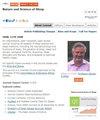The Impact of Post-COVID-19 Conditions on Sleep and Quality of Life in Indonesia: A Nationwide Cross-Sectional Study
IF 3
2区 医学
Q2 CLINICAL NEUROLOGY
引用次数: 0
Abstract
Background: Sleep disturbances are included in the six most commonly cited complaints in post-COVID-19 conditions. In order to find the optimal management approach and enhance Quality of Life (QoL), we intend to explore sleep disturbances that occur in post-COVID-19 conditions.Methods: This was a cross-sectional study conducted with interviews and questionnaires using the Pittsburgh Sleep Quality Index (PSQI) for assessing sleep quality, Insomnia Severity Index (ISI) for assessing insomnia, Epworth Sleepiness Scale (ESS) for assessing Excessive Daytime Sleepiness (EDS), STOP-BANG questionnaire for assessing Obstructive Sleep Apnea (OSA), and Short Form 36 (SF-36) for assessing QoL. We recruited respondents from several cities in Indonesia and performed an analysis to find the relationship between sleep disturbance and its association with QoL.
Results: This study involved 757 respondents. They were predominantly female, with a median age of 39 years, no comorbidities, and had exhibited mild COVID-19 severity. Subjects with post-COVID-19 conditions experienced insomnia, poor sleep quality, normal sleepiness, and low risk of OSA. Sleep quality caused role limitations due to decreased physical and mental health. Insomnia caused role limitations due to emotional and social functioning problems. Meanwhile, OSA only affected physical functioning.
Conclusion: Numerous aspects of patients’ QoL are affected by sleep disturbance in post-COVID-19 conditions. A comprehensive approach and coordinated care pathways must be effectively managed to improve QoL among individuals experiencing sleep disturbance.
印度尼西亚 COVID-19 后情况对睡眠和生活质量的影响:一项全国性横断面研究
背景:睡眠障碍是COVID-19后病症中最常见的六种主诉之一。为了找到最佳的管理方法并提高生活质量(QoL),我们打算探讨 COVID-19 后病症中出现的睡眠障碍:这是一项横断面研究,通过访谈和问卷调查,使用匹兹堡睡眠质量指数(PSQI)评估睡眠质量、失眠严重程度指数(ISI)评估失眠、埃普沃斯嗜睡量表(ESS)评估日间过度嗜睡(ESS)、STOP-BANG 问卷评估阻塞性睡眠呼吸暂停(OSA)以及短表 36(SF-36)评估 QoL。我们从印度尼西亚的几个城市招募了受访者,并对睡眠障碍及其与 QoL 的关系进行了分析:本研究涉及 757 名受访者。他们主要为女性,中位年龄为 39 岁,无合并症,COVID-19 严重程度为轻度。有 COVID-19 后遗症的受试者失眠、睡眠质量差、嗜睡正常、OSA 风险低。由于身心健康下降,睡眠质量会导致角色受限。失眠会导致情感和社会功能问题,从而造成角色限制。同时,OSA 只影响身体功能:结论:COVID-19 后患者的 QoL 多方面受到睡眠障碍的影响。要改善睡眠障碍患者的 QoL,必须采取综合方法和协调的护理途径。
本文章由计算机程序翻译,如有差异,请以英文原文为准。
求助全文
约1分钟内获得全文
求助全文
来源期刊

Nature and Science of Sleep
Neuroscience-Behavioral Neuroscience
CiteScore
5.70
自引率
5.90%
发文量
245
审稿时长
16 weeks
期刊介绍:
Nature and Science of Sleep is an international, peer-reviewed, open access journal covering all aspects of sleep science and sleep medicine, including the neurophysiology and functions of sleep, the genetics of sleep, sleep and society, biological rhythms, dreaming, sleep disorders and therapy, and strategies to optimize healthy sleep.
Specific topics covered in the journal include:
The functions of sleep in humans and other animals
Physiological and neurophysiological changes with sleep
The genetics of sleep and sleep differences
The neurotransmitters, receptors and pathways involved in controlling both sleep and wakefulness
Behavioral and pharmacological interventions aimed at improving sleep, and improving wakefulness
Sleep changes with development and with age
Sleep and reproduction (e.g., changes across the menstrual cycle, with pregnancy and menopause)
The science and nature of dreams
Sleep disorders
Impact of sleep and sleep disorders on health, daytime function and quality of life
Sleep problems secondary to clinical disorders
Interaction of society with sleep (e.g., consequences of shift work, occupational health, public health)
The microbiome and sleep
Chronotherapy
Impact of circadian rhythms on sleep, physiology, cognition and health
Mechanisms controlling circadian rhythms, centrally and peripherally
Impact of circadian rhythm disruptions (including night shift work, jet lag and social jet lag) on sleep, physiology, cognition and health
Behavioral and pharmacological interventions aimed at reducing adverse effects of circadian-related sleep disruption
Assessment of technologies and biomarkers for measuring sleep and/or circadian rhythms
Epigenetic markers of sleep or circadian disruption.
 求助内容:
求助内容: 应助结果提醒方式:
应助结果提醒方式:


